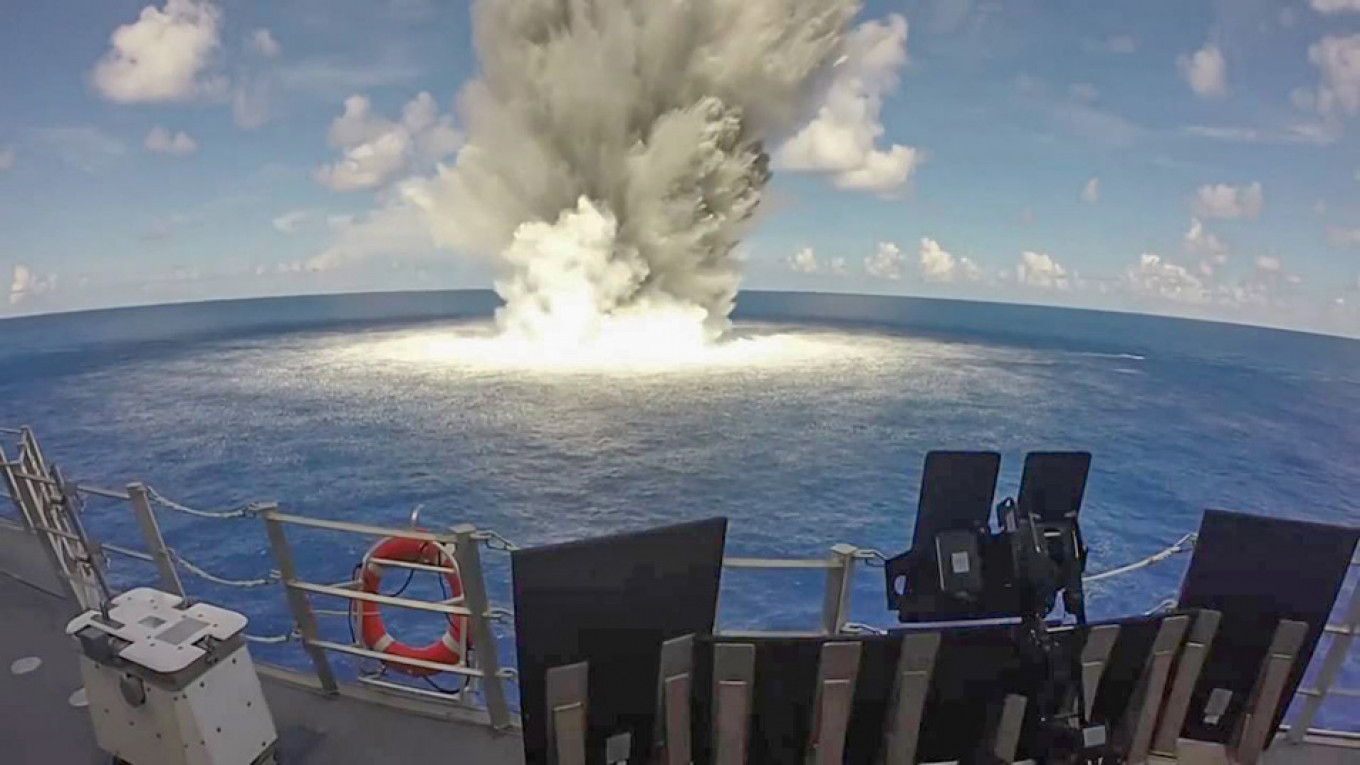
At least five nuclear experts have been killed in a mysterious explosion during a rocket engine test at sea in northern Russia four days ago.
Officials have been slow to release information about Thursday’s blast, which led to a radiation spike in a nearby city and sparked heightened demand for iodine.
U.S.-based nuclear experts said they suspected the explosion occurred during the testing of a nuclear-powered cruise missile touted by President Vladimir Putin last year.
Here’s what we know about the explosion so far:
What happened?
— The rocket’s fuel caught fire, causing it to detonate and knock several people into the White Sea, the state nuclear agency Rosatom was quoted as saying by the state-run TASS news agency.
— Officials in the nearby city of Severodvinsk said radiation had briefly spiked without saying how high, but their statement was taken down on Friday without explanation. Regional media reported that local residents had begun stocking up on iodine, which is used to reduce the effects of radiation exposure.
— Authorities said after the incident they had shut down part of a bay in the White Sea, although public shipping information from the port of Arkhangelsk showed the area had been closed for the preceding month. It did not say why.
What are the authorities saying?
— The involvement of nuclear workers was acknowledged for the first time by Russia’s state nuclear agency Rosatom on Saturday. It said three of its staff members have been hospitalized.
— On Monday, Rosatom CEO Alexei Likhachev said staffers at its affiliate nuclear center died during testing of an unspecified “new special diesel.” Likhachev added that Rosatom will “finish” works on new weapons systems without specifying what weapons he was referring to.
— In a video interview published late on Sunday, Russian officials at the nuclear research institute where the scientists had worked said the accident had caused a twofold rise in radiation levels that had only lasted an hour.
— Meanwhile, Russia’s consumer watchdog branch in the Leningrad region has assured St. Petersburg residents that radiation levels are “stable.”
What is the media reporting?
— St. Petersburg’s Fontanka.ru news website quoted a video statement by one of the leaders of the nuclear center as suggesting that the blast occurred at a “compact nuclear reactor.”
— Fontanka later updated its report with a statement from Rosatom which said that the suggestion referred to “tests of a radioisotope power supply,” not a “reactor.”
“It’s a nuclear battery, just so you understand,” the state nuclear monopoly was quoted as saying.
— Vyacheslav Solovyev, one of the officials at the institute in the closed city of Sarov, said: “These developments are also actually happening in many countries. The Americans last year…also tested a small-scale reactor… Our center also continues to work in this direction.“
— Russian media have said the rocket engine explosion may have occurred at a weapons testing area near the village of Nyonoksa. Those reports say an area near Nyonoksa is used for tests on weapons, including ballistic and cruise missiles that are used by the Russian Navy.
Casualties:
— Rosatom named the five nuclear experts as Alexei Vyushin, Evgeny Koratayev, Vyacheslav Lipshev, Sergei Pichugin and Vladislav Yanovsky. The agency released the five experts’ photos to the RBC news website on Monday.
— As many as six other staff members were injured and transported by helicopter to Moscow to be treated for radiation exposure, the Baza Telegram channel reported. The workers were brought from the airplane to a Moscow hospital in vehicles wrapped in film, the Telegram channel added. Rosatom has said that three people were injured in the blast.
— The experts, who worked for the center based at the closed city of Sarov, have been put forward for state awards, officials said, without specifying which honors they might receive.
— The Sarov city administration announced two days of mourning, saying Sunday the experts died while “performing a task of national importance.” Russia held a memorial service for the five scientists on Monday.
Reuters contributed reporting to this article.
